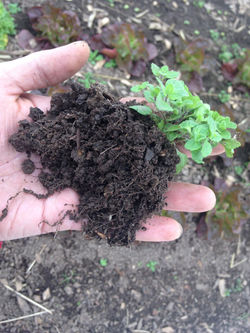
UNBOUND GLORY FARM
Regenerative Agriculture in Pomfret, CT
What is Regenerative Agriculture?
Regenerative Agriculture is a system of farming practices that focuses on promoting biodiversity, enriching soils, increasing carbon sequestration, and overseeing net-positive land stewardship. We focus on improving soil health through the use of carbonaceous and living mulches, cover-cropping, and zero-tillage. We support a diversity of life in the fields with native pollinator plantings and our commitment to using no conventional or organic chemical interventions that disrupt life in the soil or the balance of nature.
Our mission on the farm is to produce nutrient-dense and delicious food that contributes to the health and well-being of our community, while also giving more back to the land and ecosystem-at-large than we take. Regenerative practices help us do just that.
Why don't we till our soil?
Tilling destroys the vast underground microbial network known as the mycorhyzzi, and disrupts the fungal and bacterial balance in the soil that lays the foundation for plant health. A healthy soil microbiome will vector nutrients and moisture to plant roots, making them healthier and more resilient. We believe that healthy plants create better tasting, and more nutrient-dense food that helps support the well-being of our community. Tilling also releases incredible amounts of carbon into the atmosphere; whereas Regenerative practices serve to sequester more carbon, helping to mitigate the human impact on global climate change. We believe Regenerative Agricultural practices hold the key to a better future for our health, and for the health of the planet.
 Healthy soils have good pore space, hold together well, and good water filtration. They also smell amazing as they are brimming with life! |  One of our pollinator tracts in full glory mid-summer, providing nectar, pollen, and habitat to our native pollinators and beneficial insects. |  Rudbeckia is not only a pretty cut flower, but great food for our pollinator friends! |
|---|---|---|
 Calendula and borage- edible for the bees and humans too! |  These monarch caterpillars were born here at Unbound Glory, captured on this milkweed munching away. Our pollinator plantings and land management practices allow for the conservation of important species like the monarch. |  Monarch on flowering milkweed in our garlic beds. |
 We use cover crops to enrich soil health and control weeds. Adam is seen here in a healthy stand of rye grass just before it's been crimped over and laid down to then serve as a mulch that suppresses weeds while keeping the soil's microbiome well fed. |  Long shot of the crimped rye, with one of our native pollinator tracts in the background and straw covered beds to the left. We always try to keep all soils covered to prevent erosion and keep the microbes in the soil happy and healthy. |  Crimping down the rye with our walking crimper that Adam designed. We try to use as little mechanization as possible. Heavy machinery can lead to compaction in the soil, decreasing pore space and impeding the natural exchange of gasses necessary for healthy soils. |
 Crimson clover- our favorite spring cover crop is as beautiful as it is helpful. Clover fixes nitrogen from the air into the soil. Why use synthetic nitrogens that pollute our water when the air is made of 78% nitrogen? Plants like crimson clover are powerhouses to pull it out of the air and put it into the soil where plants can access it! |  Once the clover starts to set seed, we crimp it down and then use it as a "living mulch", keeping the roots intact in the soil and planting our crops right into the bed. |  Summer squash planted into crimped over crimson clover. |
 Carbonaceous mulch (straw) in our winter squash patch. Mulches help suppress weeds, prevent erosion, AND feed the soil's microbiome. |  We like to keep our soils covered, here is more straw mulch in the onion beds. |  Two of our four high tunnels were built using a permaculture technique called Hugulkultur, where woody materials are buried beneath the soil to enhance soil fertility and water retention, resulting in nutrient-dense and super flavorful crops such as our super sweet cherry tomatoes. |